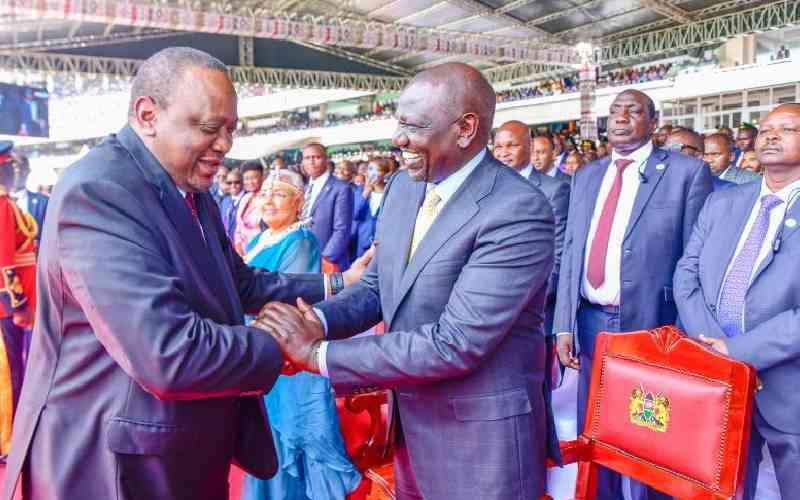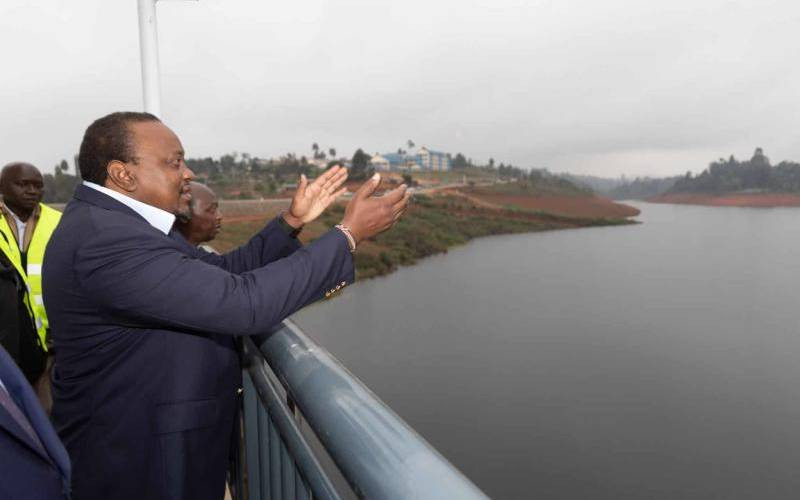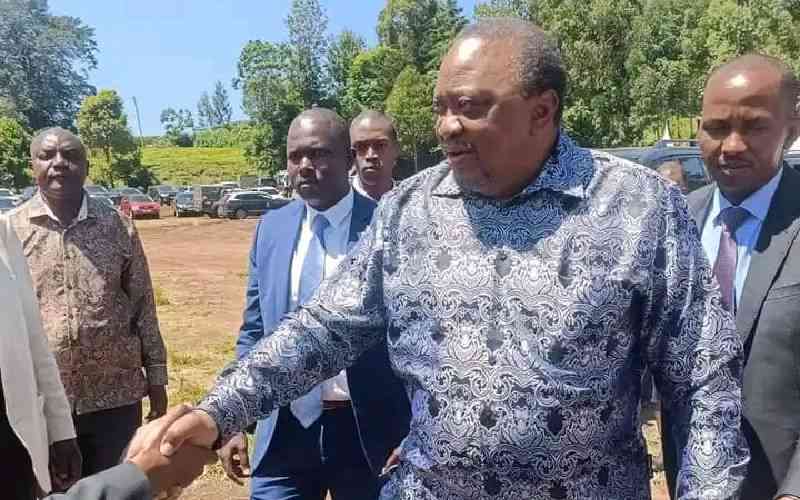 |
|
Parliament Majority Leader Adan Duale is among the team set to spearhead Jubilee campaign. |
Kenya: Rivalry between President Uhuru Kenyatta and Opposition leader Raila Odinga took a steeper plunge Tuesday with reports that the Head of State had tasked a group of Jubilee leaders to get down to the grassroots and help crush the clamour for a referendum.
In what rekindles memories of the political fights between former President Kibaki and Raila, then his key ally in National Rainbow Coalition, culminating in the defeat of the Government in the 2005 referendum and setting tempo for 2007 big race, Uhuru and Raila appeared to be headed in the same course.
With Raila pushing for a referendum that appears to be a platform on which he hopes to humiliate Uhuru and his Jubilee leadership, the President has let out fresh signs that he is not going to sit by as Odinga tinkers with the legs of his royal chair. With this, the tone of his response changed and it appears the referendum politics is what will set the tempo for the 2017 elections where Uhuru is set to seek re-election while Raila has declared he will be on the ballot for the presidency.
The lack of cessation in the rivalry between the two, aggravated by 2007’s decision by Uhuru to support Kibaki while he had been in Opposition with Raila, and then the defeat of Odinga in 2013 presidential race, appears set to dominate the country’s politics, most likely right into the next big race.
By contrast, the latest source of conflict between the two leaders is a campaign that has, ironically, united them twice in the past — in 2005 and 2010 during referendum politics.
In 2005, Uhuru and Raila campaigned for the “Orange” against the Banana (Yes) and they reunited in the coalition government to campaign for a new constitution in 2010.
Ironically, it is the Constitution they successfully campaigned for against a wave of opposition then led by William Ruto (now Uhuru’s Deputy) that has set them up against each other.
Raila’s opposition Coalition for Reforms and Democracy (CORD) is already collecting one million signatures required to press on with the referendum while governors are planning a parallel initiative.
The referendum campaigns, which followed Raila’s return from a nearly three-month tour of US on May 30, have plunged the nation in another election cycle.
President Uhuru has interpreted the referendum push as an attempts to distract his Jubilee Government and has asked Raila to respect his presidency.
“I want to tell my brother Raila Odinga to respect the Presidency. If he was elected the President, I would not be standing by the roadside to insult him,” President Kenyatta said on July 27 in Mathare Constituency.
“Kenyans made a choice in 2013 and they chose the Jubilee Government. Those calling for a referendum should save their energy for 2017 because it’s not far away,” Uhuru said in Dallas, US during a recent tour.
But Raila has, however, insisted that the opposition can’t keep quiet when the country is being governed in the wrong way.
“When I was away in the US, Kenyans wrote me a long letter. When I came to Uhuru Park, Kenyans carried placards saying; ‘Show us the way Baba.’ I said where there is a will, there is a way. I said the way is for us to sit and discuss because there is a problem,” Raila said, referring to a popular campaign that preceded his return from the US.
The high cost of living, corruption and insecurity were among the problems cited and over which CORD asked Jubilee to agree to dialogue on but later resorted to a push to amend the constitution after the governing coalition snubbed the offer.
Stay informed. Subscribe to our newsletter
CORD is framing its referendum around populist issues like pressing for more funds to the counties and addressing insecurity that also resonates with the Governors’ clamour.
To kill the quest for referendum, President Uhuru Kenyatta and his deputy William Ruto have reportedly assigned key Jubilee leaders strongholds to spearhead the Government's anti-referendum campaigns.
Apparently, they are banking on a strategy that helped Jubilee ride to power in last year’s elections to fight back the twin referendum campaigns.
Sources told The Standard that Senate Majority Leader Kithure Kindiki would lead the ‘No’ campaigns in Mount Kenya region while his National Assembly counterpart Aden Duale would root for the government’s position in areas dominated by pastoralist areas.
Nairobi Senator Mike Sonko is tasked with Nairobi and adjacent regions, Kericho Senator Charles Keter will spearhead the campaigns in South Rift while Senators Kipchumba Murkomen (Elgeyo Marakwet) and Stephen Sang (Nandi) will lead the push in the North Rift.
Politicians to spearhead the campaign at the Coast, Western and Nyanza will also be identified in due course, our source intimated.
The Government’s position is that faced with budgetary constraints, it is not prudent to spend Sh10 billion on the referendum because the amount will inevitably be sliced off the development kitty. “You can imagine taking Sh10 billion from development expenditure to fund a referendum. This money will not come from the recurrent expenditure but money we have budgeted for development,” said Kindiki.
This suggests that the government is determined to ensure the referendum doesn’t take off, which means ensuring the quest does not secure the support of 24 of the 47 counties. “We can’t announce our strategy yet. It would be premature and prejudicial,” Kindiki said when asked if this is the game plan or whether the Government has resigned to the fate of campaigning on the ‘No’ side.
“The government is not scared at all. We won the election by more than 860,000 votes, so why should we be worried? Our concern is that we shall have three referendums in nine years, is this really progressive?” Duale posed.
“We really are not opposed to some of the issues they are talking about but the timing is wrong. Let us finish the transition period that ends in August 2016 then we can sit down and look at the issues that need to be adjusted,” Kindiki suggested.
“As Government, we are opposed to a referendum because it was not part of our manifesto to the electorate. We did not promise Kenyans constitutional amendments so a referendum is not a priority for us,” argued Murkomen.
 The Standard Group Plc is a
multi-media organization with investments in media platforms spanning newspaper
print operations, television, radio broadcasting, digital and online services. The
Standard Group is recognized as a leading multi-media house in Kenya with a key
influence in matters of national and international interest.
The Standard Group Plc is a
multi-media organization with investments in media platforms spanning newspaper
print operations, television, radio broadcasting, digital and online services. The
Standard Group is recognized as a leading multi-media house in Kenya with a key
influence in matters of national and international interest.
 The Standard Group Plc is a
multi-media organization with investments in media platforms spanning newspaper
print operations, television, radio broadcasting, digital and online services. The
Standard Group is recognized as a leading multi-media house in Kenya with a key
influence in matters of national and international interest.
The Standard Group Plc is a
multi-media organization with investments in media platforms spanning newspaper
print operations, television, radio broadcasting, digital and online services. The
Standard Group is recognized as a leading multi-media house in Kenya with a key
influence in matters of national and international interest.









